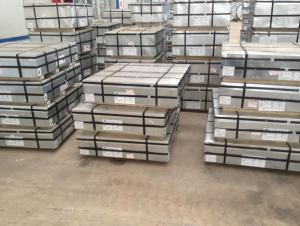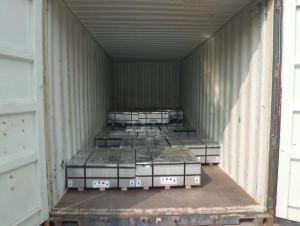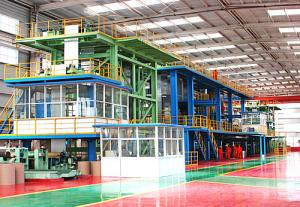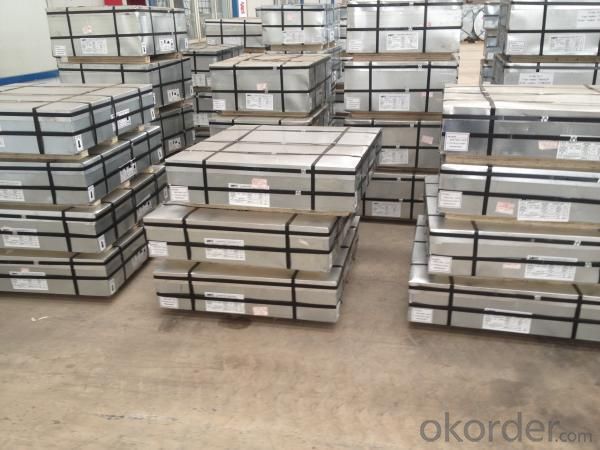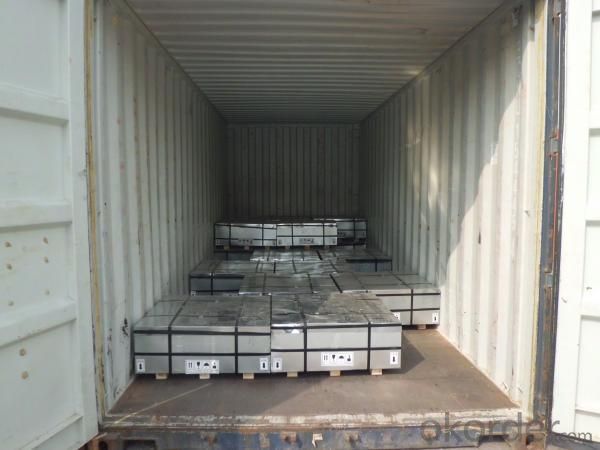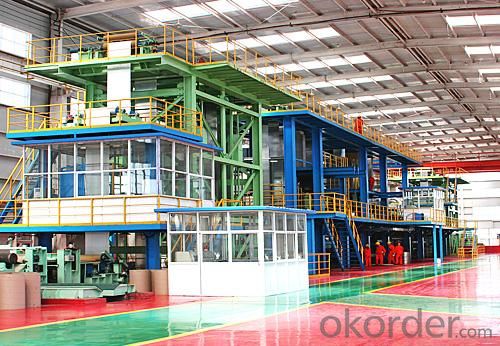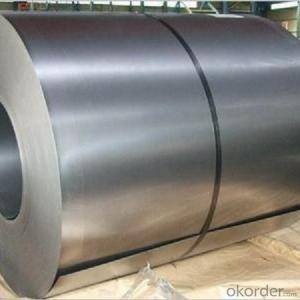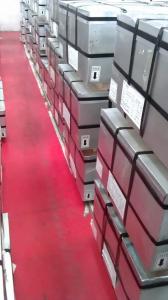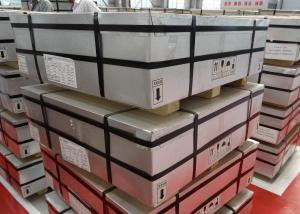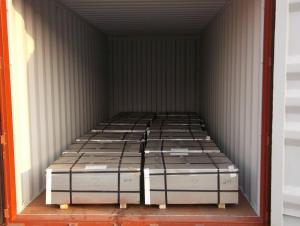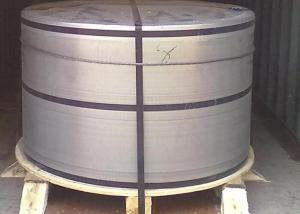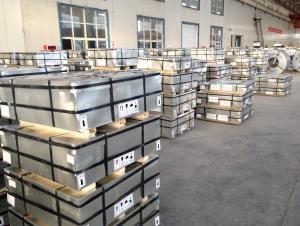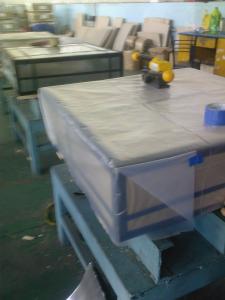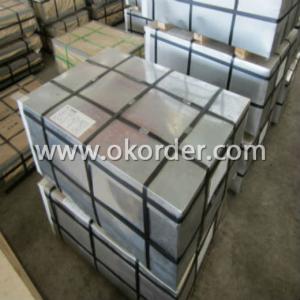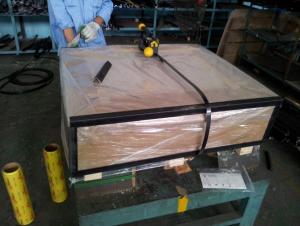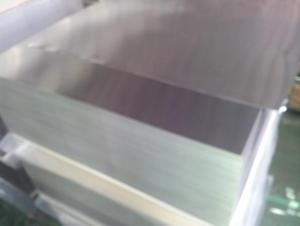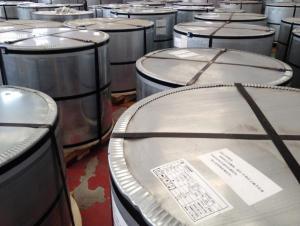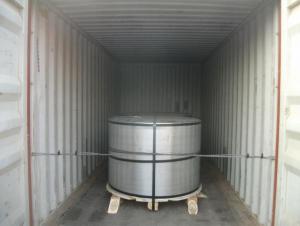Tinplate For Cookie Can-CHBA
- Loading Port:
- China Main Port
- Payment Terms:
- TT or L/C
- Min Order Qty:
- 20 Tons~25 Tons m.t.
- Supply Capability:
- 40000 MT Per Month m.t./month
OKorder Service Pledge
OKorder Financial Service
You Might Also Like
General information of Tinplate For Cookie Can
Steel Type | MR |
Temper (BA&CA) | T1~T5, DR8 |
Coating | 2.8~8.4g/m2 |
Thickness & Tolerance | 0.15~0.5mm (Tolerance:±0.01mm) |
Width & Tolerance | 600~1000 mm(Tolerance: +2/-0mm) |
I.D | 508 MM |
Coil Weight | 3~10 MT |
Passivation | 311 |
Oiling | DOS |
Surface Finish | Bright ,Stone ,Silver ,Matte |
Min Order | 25 Tons for 1 20 feet FCL |
Package | Seaworthy Export Standard Wooden Pallet |
Standard Available | GB/T2520-2000, JIS G3303, ASTM A623, BS EN10202 |
Lead Time | 35 days after receiving buyer's original L/C or Prepayment |
Special specifications are available on customers' requirements. | |
Technical data of Tinplate For Cookie Can
Chemical Composition(%) | Mechanical Property |
C:0.02~0.04 | Yield Strength: (Mpa):280~320 |
Si:0.01~0.03 | TensileStrength: (Mpa):340~390 |
Mn:0.18~0.22 | Elongation:20%~30% |
P:0.014~0.016 | ------------- |
S:0.006~0.009 |
Application of Tinplate For Cookie Can
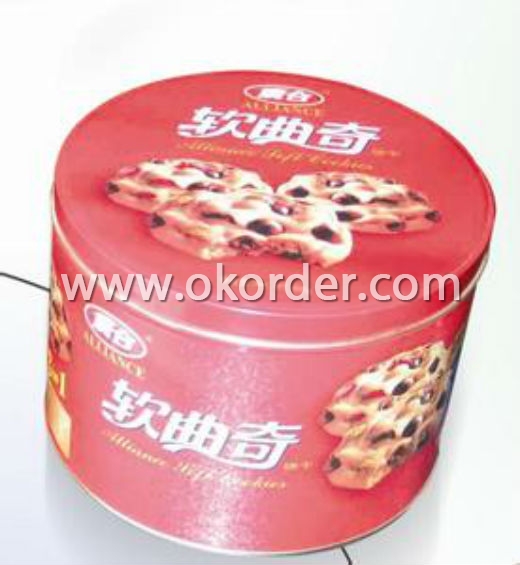
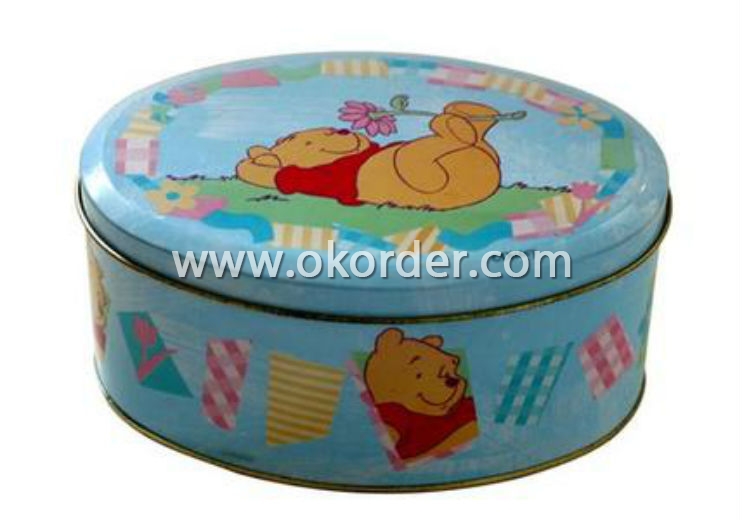
Tinplate is widely used for making all types of containers such as artistic cans, tea cans, painting cans,
chemical package cans and metal printing etc. Its applications are not limited to containers; recently,
tinplate has also been used for making electrical machinery parts and many other products.
Equipment and Facility
Tin Coating Line
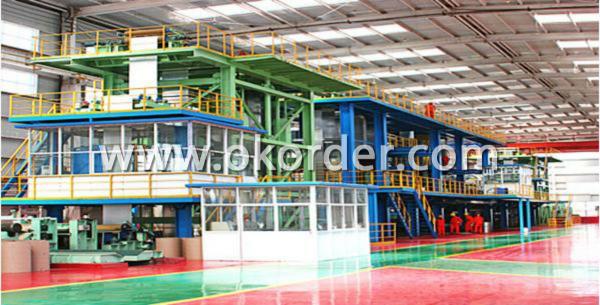
Cold Rolling Mill Batch Annealing Furnaces
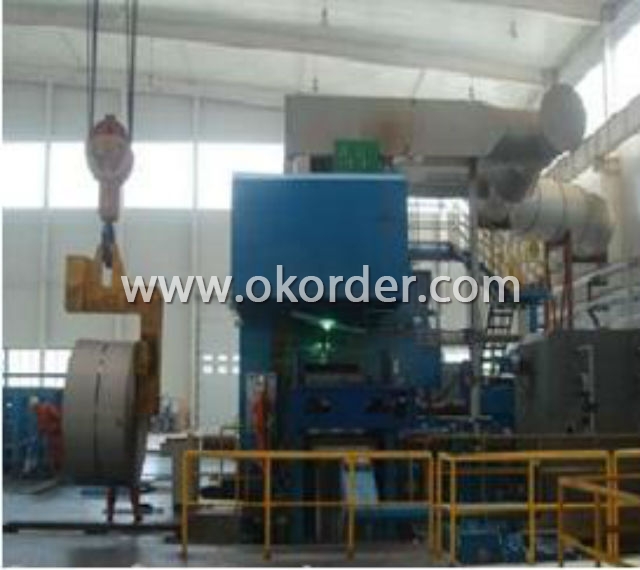
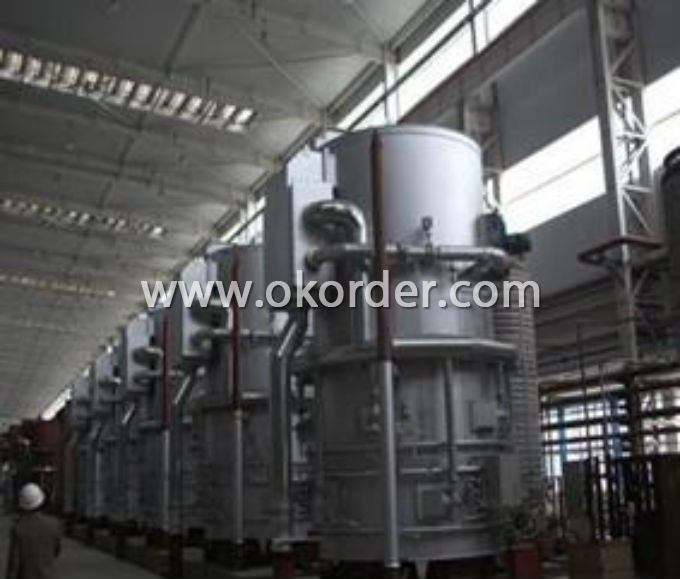
Cutting Line Stock Area
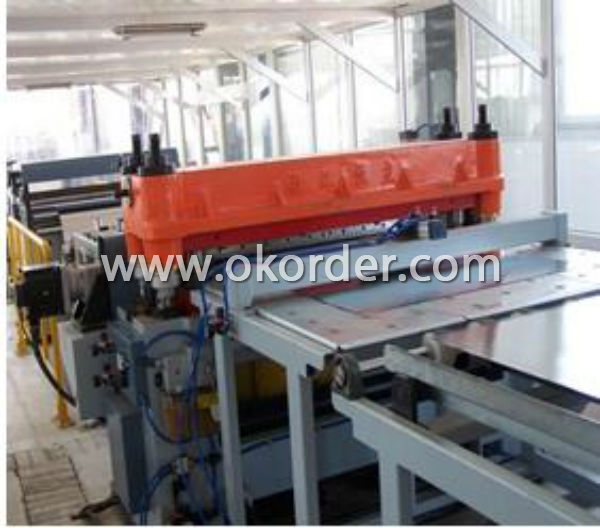
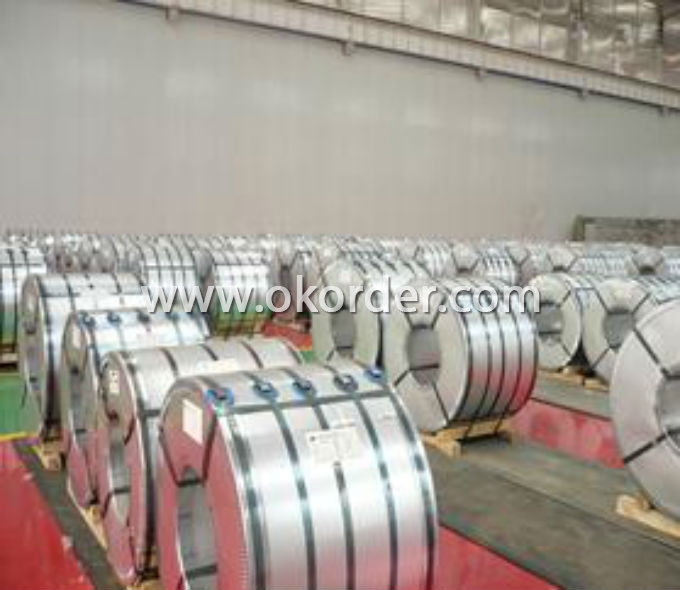
Quality Control System
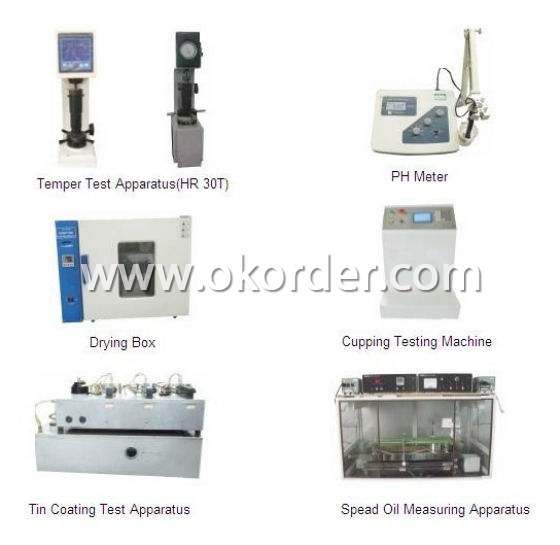
- Q: What are the common sizes and thicknesses of tinplate?
- The common sizes of tinplate range from 0.14mm to 0.60mm in thickness, with typical widths varying from 600mm to 1200mm.
- Q: What's the latest price for tinplate?
- Now private factories can be produced, the thinnest can be produced to 0.14MM, the most thick can be 0.6MM. Tin can be plated with different thickness. The hardness of DR8, DR9, T1 these private tinplate factory can reach
- Q: Can tinplate be used for frozen food packaging?
- Yes, tinplate can be used for frozen food packaging. Tinplate is a commonly used material for food cans and it provides excellent protection against moisture, light, and oxygen, which helps to maintain the quality and freshness of frozen food products.
- Q: How does tinplate handle exposure to different atmospheric conditions?
- Tinplate generally handles exposure to different atmospheric conditions quite well. Its corrosion resistance, thanks to the tin coating, helps protect the underlying steel from rusting and other forms of degradation. However, extreme conditions such as high humidity, acidic environments, or prolonged exposure to saltwater may still pose some risk. In such cases, additional protective measures like coatings or proper maintenance are recommended to ensure the tinplate's longevity.
- Q: How does tinplate contribute to the preservation of aerosol products?
- Tinplate contributes to the preservation of aerosol products by providing a durable and protective container that helps prevent the penetration of moisture, air, and light which can degrade the quality and effectiveness of the product. Additionally, tinplate containers are resistant to corrosion, ensuring the longevity and integrity of aerosol products.
- Q: How does tinplate packaging contribute to product protection against moisture?
- Tinplate packaging contributes to product protection against moisture due to its inherent properties. The tin coating on the steel substrate acts as a barrier, preventing moisture from seeping into the packaging and reaching the product. This protective layer ensures that the product remains dry and free from any potential damage caused by moisture, such as rust or deterioration. Additionally, tinplate packaging is often sealed tightly, further enhancing its ability to keep moisture out and maintain the product's quality and freshness.
- Q: Can tinplate be used for packaging heavy products?
- Yes, tinplate can be used for packaging heavy products. Tinplate is a durable material made of steel coated with a thin layer of tin, providing strength and protection. It is commonly used for packaging heavy items such as canned foods, beverages, and industrial products due to its ability to withstand pressure and protect the contents from damage.
- Q: How does tinplate affect the environment?
- Tinplate can have both positive and negative impacts on the environment. On one hand, tinplate is a highly recyclable material, which helps reduce the demand for new raw materials and decreases waste generation. Additionally, tinplate is often used as a protective coating on steel cans, preventing corrosion and extending their lifespan. This contributes to reducing the need for frequent replacements and conserving resources. However, the production of tinplate involves mining and refining tin ore, which can lead to habitat destruction, soil erosion, and water pollution if not managed properly. Furthermore, the manufacturing process may emit greenhouse gases and other air pollutants. Overall, the impact of tinplate on the environment depends on various factors, including its lifecycle management and the efficiency of recycling processes.
- Q: Can tinplate packaging be used for gardening products?
- Yes, tinplate packaging can be used for gardening products. Tinplate is a durable and corrosion-resistant material that can protect gardening products such as seeds, fertilizers, or small tools from moisture, light, and other external factors. Additionally, tinplate packaging can be designed with attractive graphics and labels to enhance product visibility and appeal to gardening enthusiasts.
- Q: What are the benefits of using tinplate for coins?
- There are several benefits of using tinplate for coins. Firstly, tinplate is a durable material that can withstand wear and tear, making it ideal for coins that are constantly being handled and circulated. Additionally, tinplate is rust-resistant, ensuring that the coins maintain their appearance and quality even in humid or wet conditions. Another advantage is that tinplate is relatively inexpensive compared to other materials, making it a cost-effective choice for producing coins in large quantities. Lastly, tinplate is highly recyclable, which aligns with the growing emphasis on sustainability and environmental consciousness in coin production.
1. Manufacturer Overview
| Location | Hebei,China |
| Year Established | 2009 |
| Annual Output Value | Above US$100 Million |
| Main Markets | North America;South America; Eastern Europe Southeast Asia; Africa; Mid East Eastern Asia; Western Europe; Central America Northern Europe; Southern Europe; Domestic Market |
| Company Certifications | HACCP;ISO 9001:2008;ISO 14001:2004 |
2. Manufacturer Certificates
| a) Certification Name | |
| Range | |
| Reference | |
| Validity Period |
3. Manufacturer Capability
| a) Trade Capacity | |
| Nearest Port | Tianjin |
| Export Percentage | 11% - 20% |
| No.of Employees in Trade Department | 6-10 People |
| Language Spoken: | English;Chinese |
| b) Factory Information | |
| Factory Size: | Above 270,000 square meters |
| No. of Production Lines | Above 12 |
| Contract Manufacturing | OEM Service Offered |
| Product Price Range | High;Average |
Send your message to us
Tinplate For Cookie Can-CHBA
- Loading Port:
- China Main Port
- Payment Terms:
- TT or L/C
- Min Order Qty:
- 20 Tons~25 Tons m.t.
- Supply Capability:
- 40000 MT Per Month m.t./month
OKorder Service Pledge
OKorder Financial Service
Similar products
Hot products
Hot Searches
Related keywords
